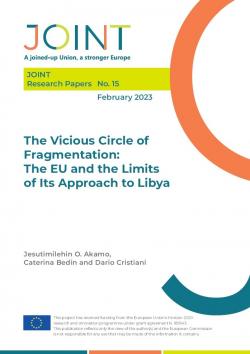The Vicious Circle of Fragmentation: The EU and the Limits of Its Approach to Libya
Due to the weak state structures inherited by Qadhafi’s regime, Libya has entered a vicious cycle of fragmentation since 2011, as sub-national and regional players have engaged in a competition for resources and power. The involvement of several international actors has exacerbated these dynamics, turning Libya into a proxy conflict. EU action in Libya has been undermined by internal divisions, especially between France and Italy. Whatever common action the EU has been able to agree upon has focused more on crisis response than long-term benefits, although lately there has been a new investment in diplomacy too. The EU has an interest in Libya centred on security, energy, migration and political pluralism. The EU should mitigate the constraints on its ability to develop a more joined-up policy by creating mechanisms to coordinate actions of EU institutions and individual member states and, on this basis, provide support to Libya’s security sector, economy and migration management structures.
-
Details
Rome, IAI, February 2023, 44 p. -
In:
-
Issue
JOINT Research Paper 15
Introduction
1. Fragmentation: Levels and actors
1.1 Libya’s troubled predicament
1.2 Fragmentation inside Libya
1.3 Fragmentation surrounding Libya
2. The interplay of fragmentation with intra-EU contestation and multipolar competition
2.1 The impact of intra-EU contestation on Libya’s fragmentation
2.2 The impact of multipolar competition on Libya’s fragmentation
3. The limits of EUFSP in relation to Libya
3.1 The unresolved dilemmas of intergovernmentalism
3.2 Border management and anti-traffic activities
4. A strategic approach for a more joined-up and sustainable EUFSP towards Libya
4.1 Political sector
4.2 Security sector
4.3 Economic sector
4.4 Migration sector
Conclusion
References



